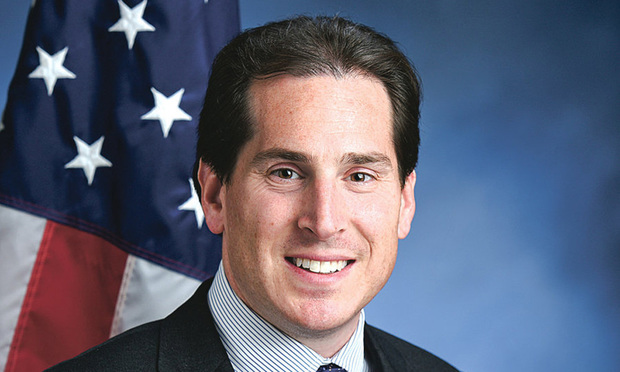Effort to Close Double Jeopardy 'Loophole' in NY Revived in New Session
State Sen. Todd Kaminsky, D-Nassau, is carrying a bill aimed at giving state law enforcement officers, including those in the office of new Attorney General Letitia James, the option to prosecute individuals who receive a presidential pardon before they are tried for federal crimes.
January 03, 2019 at 03:08 PM
6 minute read
 New York State Sen. Todd Kaminsky, D-Nassau (Courtesy photo)
New York State Sen. Todd Kaminsky, D-Nassau (Courtesy photo)
Legislation in New York to close the double jeopardy “loophole,” which bars state prosecutors from bringing similar charges against individuals pardoned of federal charges by the president of the United States, was reintroduced in the Legislature this week.
The bill is aimed at giving state law enforcement officers, including those in the office of new Attorney General Letitia James, the option to prosecute individuals who receive a presidential pardon before they are tried for federal crimes.
State Sen. Todd Kaminsky, D-Nassau, first introduced the bill during last year's legislative session and will carry it again in 2019. It was blocked last year in the Senate by Republicans, who largely labeled it as a political attack on President Donald Trump rather than a necessary change to the state's criminal procedure law.
The bill is more likely to pass in the Senate this year after Democrats won a firm majority in the chamber during last year's general election. It's the first time Democrats will control the state Senate in nearly a decade. The party has held the Assembly consistently for decades.
But one-party control of both houses of the Legislature does not mean Kaminsky's bill will be a slam-dunk this session. Democrats in the Assembly did not unanimously support the bill last year, and Kaminsky said he still needs to speak to the new members of his conference about the legislation.
While the bill was a top priority for him last year, Kaminsky said the gravity of its consequences have grown since the previous legislative session.
“I think the president, the way he speaks about pardons and the way he speaks about the investigation that swirls around him should give us all cause for concern,” Kaminsky said. “Every day this bill is not law, we are potentially taking options off the table for holding him and other presidents accountable who want to flout the rule of law. I think it takes on even greater importance as we move into the new session.”
That's because the legislation would not apply to individuals pardoned by the president after their trial on federal charges begins. Double jeopardy, which prevents state charges based on an identical set of facts used to bring federal charges, is attached at the start of the trial.
Take the case of Paul Manafort, the former chairman of Trump's presidential campaign. He was convicted on federal charges of fraud unrelated to the campaign, but could still receive a pardon from Trump. Even if the president decided to grant him clemency, state prosecutors in New York would be barred from bringing their own charges because double jeopardy had already been applied.
That was one of two cases that prompted Gov. Andrew Cuomo to voice his support for the legislation earlier this year. The other was the guilty plea of Michael Cohen, Trump's former attorney.
“New York must have the ability to stand up against the abuse of power,” Cuomo said at the time. “I call on the State Legislature to amend current State law to close the double jeopardy loophole and ensure that these wrongdoers cannot escape justice—I will sign it into law the same day.”
The legislation also has been strongly supported by James, a Democrat who said last year she would advocate for the bill while in office. James has been clear that she intends to place a microscope over Trump and his family in any way that the state's chief law enforcement office can. Attorneys under James would need a criminal referral from an appropriate state agency to begin a criminal investigation into any of those individuals.
She repeated her support for the bill earlier this week during an inauguration ceremony on Ellis Island.
“I will work in a legal system where even the most powerful federal official in the country cannot use a loophole to evade justice,” James said.
But some Democrats in the Legislature interpret the bill as too vague in its current form. There are concerns that removing the so-called double jeopardy loophole could backfire at some point down the line, regardless of its intention to hold Trump and future presidents accountable for their choices in clemency.
Consider a scenario where an individual who faces charges related to an act of civil disobedience is pardoned by a president in the future after public pressure to prevent federal prosecutors from moving forward with the case. Under the current bill, a state prosecutor in New York could bring state charges against that individual based on the same set of facts.
That's the kind of situation Democrats who are reluctant to support the bill want to avoid. Assemblyman Joe Lentol, a Democrat from Brooklyn who sponsored the bill last year, said in a previous interview that members of his conference may be more likely to support the legislation if it was more specific about which crimes would be addressed.
“I think we could do this and really make matters worse for people who are in a situation to get pardoned and have to get retried again,” Lentol said. “I think that these unintended consequences need to be vetted before we move forward.”
Kaminsky said conversations on how the bill could be changed to win the support of those members will begin at the start of this year's session, which begins next week. With the Senate previously in Republican hands, there wasn't much use in getting into the weeds on the legislation. This year, Kaminsky said, he plans to hear out the concerns of other Democrats and see if they can be addressed somehow in the legislation.
“I expect those to happen shortly. Obviously the in-depth conversations didn't have to happen last year because it was clear a Republican Senate wasn't going to act on it,” Kaminsky said. “I think we have to take those concerns seriously and work with all of our partners, including the executive, to work on this.”
Kaminsky already has a strong ally on the legislation in the Senate. Sen. Jamaal Bailey, a Democrat from the Bronx and the new chair of the Codes Committee, is a co-sponsor of the bill. That committee will have to review the legislation before it heads to the Senate floor for a vote. That's not necessarily a bellwether, though. Lentol chairs his chamber's Codes Committee, which did not move the bill last year.
Lawmakers will return to Albany to begin this year's legislative session on Jan. 9.
READ MORE:
Bill to Close So-Called Double Jeopardy Loophole Would Not Affect Manafort, Cohen
Criminal Justice Reforms More Likely in NY as Democrats Take Office
Lawmakers Leave Albany With Loose Ends Untied on Criminal Justice, Litigation
This content has been archived. It is available through our partners, LexisNexis® and Bloomberg Law.
To view this content, please continue to their sites.
Not a Lexis Subscriber?
Subscribe Now
Not a Bloomberg Law Subscriber?
Subscribe Now
NOT FOR REPRINT
© 2025 ALM Global, LLC, All Rights Reserved. Request academic re-use from www.copyright.com. All other uses, submit a request to [email protected]. For more information visit Asset & Logo Licensing.
You Might Like
View All

Family Law Practitioners Weigh In on Court System's New Joint Divorce Program

Former NY City Hall Official Tied to Adams Corruption Probe to Plead Guilty

New Charges Expected in Sex Trafficking Case Against Broker Brothers
Trending Stories
- 1ACC CLO Survey Waves Warning Flags for Boards
- 2States Accuse Trump of Thwarting Court's Funding Restoration Order
- 3Microsoft Becomes Latest Tech Company to Face Claims of Stealing Marketing Commissions From Influencers
- 4Coral Gables Attorney Busted for Stalking Lawyer
- 5Trump's DOJ Delays Releasing Jan. 6 FBI Agents List Under Consent Order
Who Got The Work
J. Brugh Lower of Gibbons has entered an appearance for industrial equipment supplier Devco Corporation in a pending trademark infringement lawsuit. The suit, accusing the defendant of selling knock-off Graco products, was filed Dec. 18 in New Jersey District Court by Rivkin Radler on behalf of Graco Inc. and Graco Minnesota. The case, assigned to U.S. District Judge Zahid N. Quraishi, is 3:24-cv-11294, Graco Inc. et al v. Devco Corporation.
Who Got The Work
Rebecca Maller-Stein and Kent A. Yalowitz of Arnold & Porter Kaye Scholer have entered their appearances for Hanaco Venture Capital and its executives, Lior Prosor and David Frankel, in a pending securities lawsuit. The action, filed on Dec. 24 in New York Southern District Court by Zell, Aron & Co. on behalf of Goldeneye Advisors, accuses the defendants of negligently and fraudulently managing the plaintiff's $1 million investment. The case, assigned to U.S. District Judge Vernon S. Broderick, is 1:24-cv-09918, Goldeneye Advisors, LLC v. Hanaco Venture Capital, Ltd. et al.
Who Got The Work
Attorneys from A&O Shearman has stepped in as defense counsel for Toronto-Dominion Bank and other defendants in a pending securities class action. The suit, filed Dec. 11 in New York Southern District Court by Bleichmar Fonti & Auld, accuses the defendants of concealing the bank's 'pervasive' deficiencies in regards to its compliance with the Bank Secrecy Act and the quality of its anti-money laundering controls. The case, assigned to U.S. District Judge Arun Subramanian, is 1:24-cv-09445, Gonzalez v. The Toronto-Dominion Bank et al.
Who Got The Work
Crown Castle International, a Pennsylvania company providing shared communications infrastructure, has turned to Luke D. Wolf of Gordon Rees Scully Mansukhani to fend off a pending breach-of-contract lawsuit. The court action, filed Nov. 25 in Michigan Eastern District Court by Hooper Hathaway PC on behalf of The Town Residences LLC, accuses Crown Castle of failing to transfer approximately $30,000 in utility payments from T-Mobile in breach of a roof-top lease and assignment agreement. The case, assigned to U.S. District Judge Susan K. Declercq, is 2:24-cv-13131, The Town Residences LLC v. T-Mobile US, Inc. et al.
Who Got The Work
Wilfred P. Coronato and Daniel M. Schwartz of McCarter & English have stepped in as defense counsel to Electrolux Home Products Inc. in a pending product liability lawsuit. The court action, filed Nov. 26 in New York Eastern District Court by Poulos Lopiccolo PC and Nagel Rice LLP on behalf of David Stern, alleges that the defendant's refrigerators’ drawers and shelving repeatedly break and fall apart within months after purchase. The case, assigned to U.S. District Judge Joan M. Azrack, is 2:24-cv-08204, Stern v. Electrolux Home Products, Inc.
Featured Firms
Law Offices of Gary Martin Hays & Associates, P.C.
(470) 294-1674
Law Offices of Mark E. Salomone
(857) 444-6468
Smith & Hassler
(713) 739-1250






